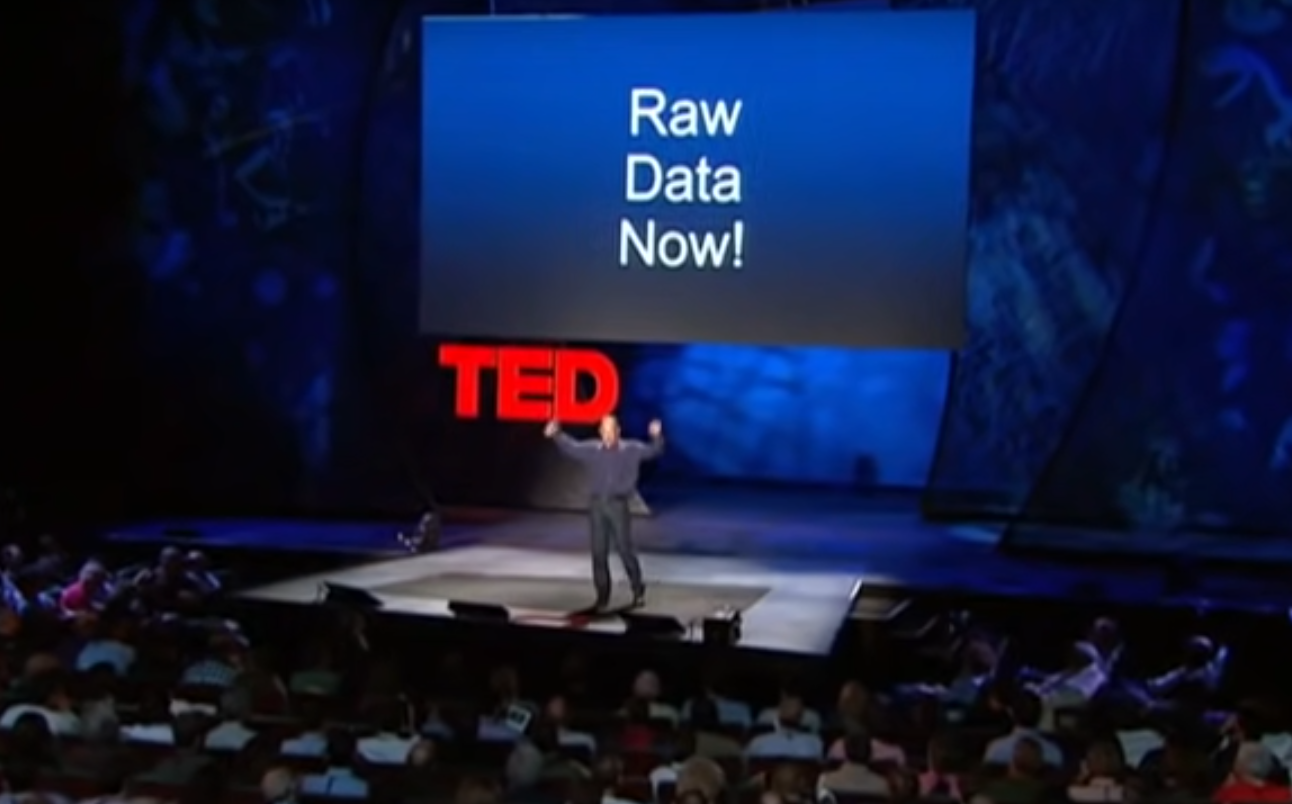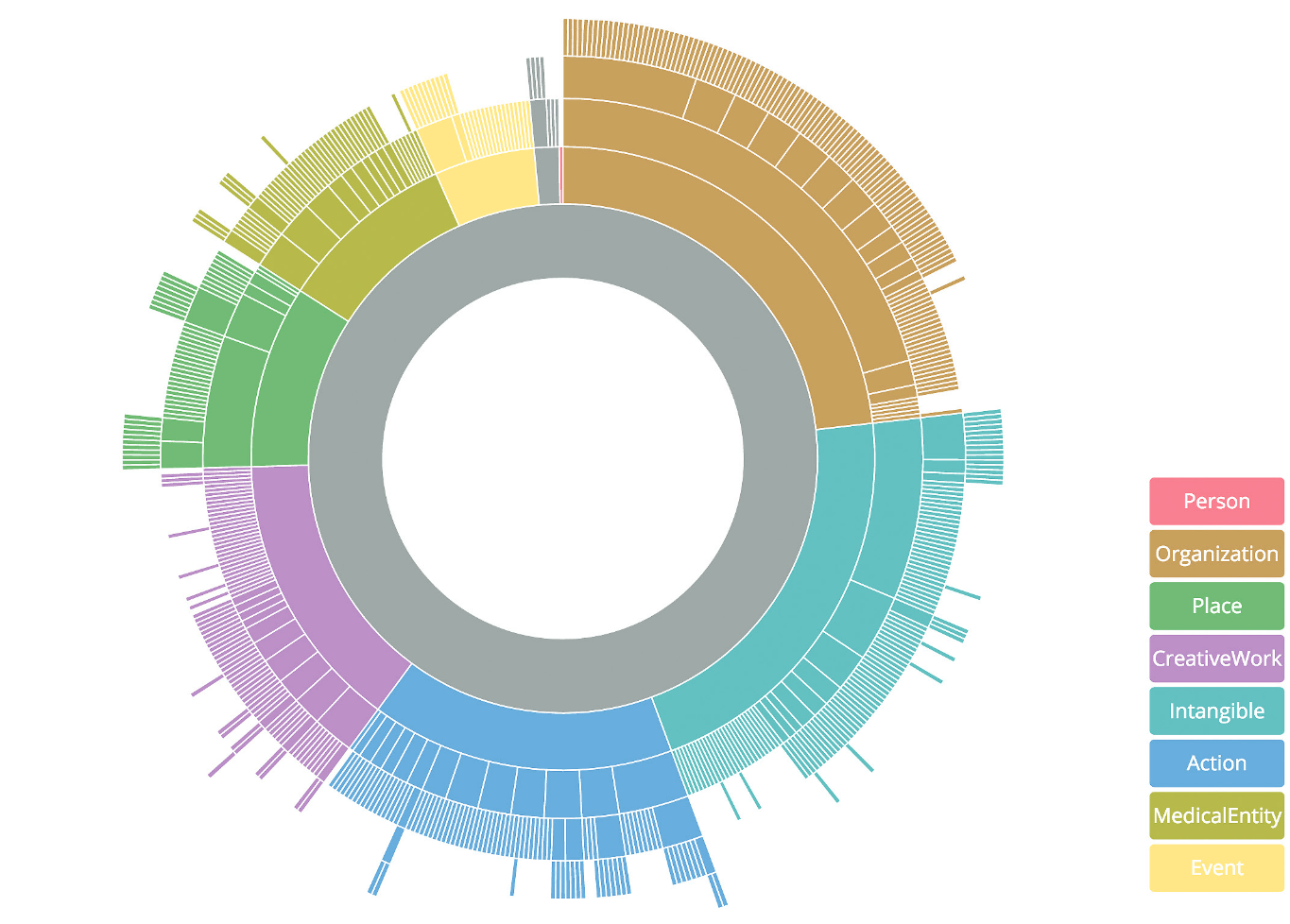RDF for the (Non-Semantic) Web
Outline
- How Useful is RDF To Web Developers?
- JSON for Linked Data
- Schema.org
- Adoption on the (Non-Semantic) Web
How Useful is RDF To Web Developers?
Despite its original XML syntax, the RDF data model is not aligned with existing Web formats: HTML (XML), JSON.
A revision of the RDF/XML syntax was designed to appeal to Web developers.
It didn't.
One possible reason for this lack of adoption is the lack of idiomatic representations of RDF data in object-oriented programming languages.
The gap between objects and triples is "too wide"...
...despite numerous object-triple mapping libraries (Ledvinka, 2018)
In addition, Web developers typically build "full-stack" applications, including a front-end, a back-end and communication between the two.
They don't particularly need to expose data in an interoperable way (i.e. with URIs everywhere).
But full-stack Web applications are not the only kind of Web app.
On the Linked Open Data (LOD) cloud, the effort is split:
- Web servers provide raw data
of quality - The Web browser renders facets of data
of interest to the user

RDF can help redistribute the effort between client and server applications on the Web.
Two technologies (among others) tend towards that objective:
- JSON-LD
- Schema.org
JSON for Linked Data
JSON: JavaScript Object Notation
JSON values can be objects, arrays or simple values.
| Type | Example |
|---|---|
| Null | null |
| Boolean | true, false |
| Number | 2.4 |
| String | "abc" |
| Object | { "a": 2.4, "b": "abc", ... } |
| Array | [ 2.4, "abc", ... ] |
"That’s it. That is all of JSON." — Douglas Crockford (Crockford, 2008)
Objects (in Java, Python, C#, etc.) can easily be (de)serialized in JSON.
RDF-based applications often require a transformation from/to objects.
↪ Can there be a standard JSON serialization of RDF?
@Namespaces({
"frbr", "http://vocab.org/frbr/core#",
"dc", "http://purl.org/dc/terms/",
"foaf", "http://xmlns.com/foaf/0.1/"
})
@RdfsClass("frbr:Expression")
@Entity
public class Book implements SupportsRdfId {
@RdfProperty("dc:title")
private String mTitle;
@RdfProperty("dc:publisher")
private String mPublisher;
@RdfProperty("dc:issued")
private Date mIssued;
@RdfProperty("foaf:primarySubjectOf")
private URI mPrimarySubjectOf;
@OneToMany(fetch = FetchType.LAZY,
cascade = { CascadeType.PERSIST, CascadeType.MERGE })
@RdfProperty("frbr:embodiment")
private Collection<Manifestation> mEmbodiments = new HashSet<Manifestation>();
// ...
}
{
"@context": {
"frbr": "http://vocab.org/frbr/core#",
"dc": "http://purl.org/dc/terms/",
"foaf": "http://xmlns.com/foaf/0.1/",
"mTitle": "dc:title",
"mPublisher": "dc:publisher",
"mIssued": {
"@id": "dc:issued",
"@type": "http://www.w3.org/2001/XMLSchema#date"
}, "mPrimarySubjectOf": {
"@id": "foaf:primarySubjectOf",
"@type": "@id"
}, "mEmbodiments": {
"@id": "frbr:embodiment",
"@container": "@set"
}
},
"@id": "http://www.wikidata.org/entity/Q13912",
"@type": "frbr:Expression",
"mTitle": "Where the Wild Things Are",
"mPublisher": "Harper & Raw",
"mIssued": "1963-11-13",
"mPrimarySubjectOf": "https://en.wikipedia.org/wiki/Where_the_Wild_Things_Are",
"mEmbodiments": [
...
]
}JSON-LD: JSON for Linked Data
A JSON-LD document has (at least) two forms:
- a compacted form
- an expanded form
Try the JSON-LD Playground to process all forms of JSON-LD.
[
{
"@id": "http://www.wikidata.org/entity/Q13912",
"http://purl.org/dc/terms/title": [
{
"@value": "Where the Wild Things Are"
}
],
"http://purl.org/dc/terms/publisher": [
{
"@value": "Harper & Raw"
}
],
"http://purl.org/dc/terms/issued": [
{
"@value": "1963-11-13",
"@type": "http://www.w3.org/2001/XMLSchema#date"
}
],
"http://xmlns.com/foaf/0.1/primarySubjectOf": [
{
"@id": "https://en.wikipedia.org/wiki/Where_the_Wild_Things_Are"
}
],
"http://vocab.org/frbr/core#embodiment": [ ... ],
}
]A JSON-LD object can be:
-
a node object (with key
@id)
~ IRI resource or blank node -
a value object (with key
@value)
~ literal
In its compacted form, a JSON-LD document has a context
(with key @context).
A JSON-LD context maps arbitrary JSON strings to IRIs.
A JSON-LD context includes several kinds of definitions.
See section 6 "Advanced concepts" of the JSON-LD W3C specification.
Compact IRIs: instead of full IRIs, JSON object keys can map to IRIs compacted with a declared prefix.
{
"@context": {
"dc": "http://purl.org/dc/terms/",
"mTitle": "dc:title",
"mPublisher": "dc:publisher"
}
}Typed Values: a default datatype range can be given to JSON object keys.
{
"@context": {
"dc": "http://purl.org/dc/terms/",
"mIssued": {
"@id": "dc:issued",
"@type": "http://www.w3.org/2001/XMLSchema#date"
}
}
}Type Coercion: a JSON string can map to a string literal or to an IRI.
{
"@context": {
"foaf": "http://xmlns.com/foaf/0.1/",
"mPrimarySubjectOf": {
"@id": "foaf:primarySubjectOf",
"@type": "@id"
}
}
}Sets and Lists: JSON arrays can map to unordered sets of triples or to RDF lists.
{
"@context": {
"frbr": "http://vocab.org/frbr/core#",
"mEmbodiments": {
"@id": "frbr:embodiment",
"@container": "@set"
}
}Schema.org
Schema.org is a collection of RDF classes and properties to describe entities typically described in Web pages.

Schema.org also provides a default JSON-LD context for Web developers to use.
{
"@context":"http://schema.org",
"@type":"Movie",
"contentRating":"PG",
"dateCreated":"2009-10-16",
"genre":["Kids & Family","Fantasy","Adventure"],
"name":"Where the Wild Things Are",
"url":"https://www.rottentomatoes.com/m/where_the_wild_things_are",
"actor":[
{
"@type":"Person",
"name":"Catherine Keener",
"sameAs":"https://www.rottentomatoes.com/celebrity/catherine_keener"
},
{
"@type":"Person",
"name":"Max Records",
"sameAs":"https://www.rottentomatoes.com/celebrity/max-records"
},
...
]
}JSON-LD data can be embedded in any Web page...
...including this one. To embed data:
- open HTML source
- add a
<script>element - give attribute
"type"="application/ld+json"
Schema.org annotations are everywhere on the Web.
E.g. on Rotten Tomatoes.
But not on Google or Amazon websites.
Web developers have tools for testing their schema.org annotations:
- Schema.org's validator
- Google's "enriched result" tester
Other Web annotations framework have got lesser attention but pursue the same goal:
Adoption on the (Non-Semantic) Web
JSON-LD, Schema.org and, to a lesser extent, RDFa and Microdata are present in:
-
more than 30% of Web pages
according to Web Data Commons -
more than 60% of Websites
according to HTTP Archive
HTTP Archive's dataset is based on user browsing habits whereas Web Data Commons is based on pure hypermedia navigation, hence some discrepancy between the two.